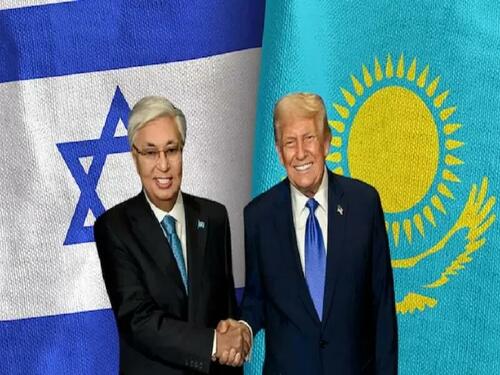Authored by Andrew Korybko via Substack,
Many observers were surprised after Kazakhstan joined the Abraham Accords during President Kassym-Jomart Tokayev’s trip to DC to attend the latest C5+1 Summit since it’s already recognized Israel since 1992.
The Presidential and Foreign Ministry websites shed more light on this decision.
The first wrote that “By joining the Abraham Accords, Kazakhstan seeks to contribute to overcoming confrontation, promoting dialogue, and supporting international law based on the principles of the UN Charter.”
It added that “The decision of Kazakhstan does not affect the country’s bilateral commitments with any state and represents a natural continuation and manifestation of its multilateral diplomacy aimed at promoting peace and security.”
The second echoed this message: “This important decision was made solely in the interests of Kazakhstan and is fully consistent with the nature of republic’s balanced, constructive, and peaceful foreign policy.”
Their statement then concluded as follows: “Joining the Abraham Accords will contribute to strengthening our country’s cooperation with all interested states and, therefore, is fully in line with Kazakhstan’s strategic goals. Kazakhstan will continue to firmly advocate for a just, comprehensive, and sustainable settlement of the Middle East conflict based on international law, relevant UN resolutions, and the principle of ‘two states for two peoples.’”
Accordingly, the official explanation is that this purely symbolic move was meant to signal support for a “two-state solution” and bolster Kazakhstan’s multi-alignment policy, but there’s actually more to it. This was indisputably intended to appeal to Trump, thus raising Tokayev’s profile in his eyes, and coincided with the raft of deals that they agreed to. This importantly includes a MoU on critical minerals that was assessed here as putting pressure, unintended by Kazakhstan but deliberate by the US, on Russia.
The above preceded Tokayev’s trip to Moscow to meet with Putin, the purpose of which was to reassure Russia that Kazakhstan isn’t siding with the US against it, but it’s now clear that Kazakhstan is more actively relying on the US for balancing Russia. It’s this trend, which isn’t new but is now taking on a qualitatively different form due to how the new TRIPP Corridor is expected to intensify US-Kazakh ties and Tokayev doing a personal favor for Trump by joining the Abraham Accords, that’s most newsworthy.
It was earlier warned that “The West Is Posing New Challenges To Russia Along Its Entire Southern Periphery”, which Russia is aware of as proven by Foreign Minister Sergey Lavrov’s recent remarks to this effect, and that “A US Think Tank Considers Kazakhstan To Be A Key Player For Containing Russia”. Nevertheless, Kazakhstan is still a member of the Russian-led CSTO military bloc and the EAEU economic one, but it’s understandable if Putin might soon begin to wonder about Tokayev’s long-term intentions.
Azerbaijan just announced that its armed forces now conform with NATO standards, and if Kazakhstan one day tries to follow suit, then Russia’s threat assessment would spike. Tokayev hasn’t signaled any such plans, but by doing a personal favor for Trump by joining the Abraham Accords, he likely expects him and the US to have his back if he ever decides to do so and this leads to a crisis with Russia. Therein lies the real significance of what he just did, which lends credence to concerns about his intentions.
Loading recommendations...
